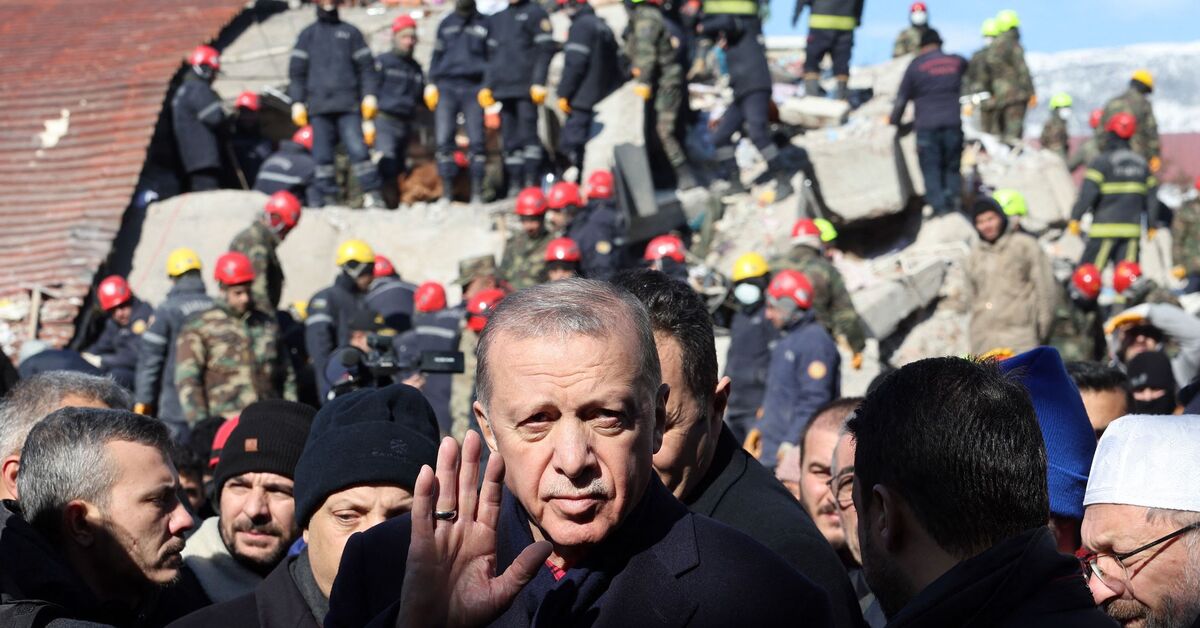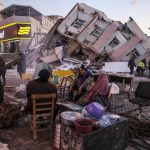Some 57 hours after earthquakes rocked southern Turkey, leaving thousands dead and many more homeless, President Recep Tayyip Erdogan arrived in the disaster zone as those trapped under the rubble faced a third night in freezing temperatures.
Erdogan flew into Kahramanmaras, the epicenter of Monday’s quakes, before heading to Hatay, a province between the Mediterranean Sea and the Syrian border that has seen the highest number of deaths.
Speaking from Hatay, he announced the latest casualty figures: 9,057 dead and 52,979 injured. More than a third of the fatalities occurred in Hatay, even though it lies more than 100 kilometers (62 miles) from the epicenter of the first and most powerful tremor.
“Undoubtedly, our job was not easy,” he said in televised comments. “The difficulty of weather conditions added to the extent of this earthquake, which was effective in an area of 500 kilometers where approximately 13.5 million people live.”
He added, “Of course there are shortcomings,” and “It is impossible to be prepared for such a disaster.”
In neighboring Syria, the death toll rose to more than 2,600, putting the overall tally above 11,000.
Erdogan earlier visited a tent city set up in a sports arena in Kahramanmaras and said tourist hotels in the Mediterranean cities of Antalya, Alanya and Mersin would be opened to house survivors, many of whom had spent two nights sleeping outside, in cars or under makeshift shelters.
He also offered 10,000 liras ($530) in support to affected families and pledged to start rebuilding housing for those left homeless within a year.
The third day of the rescue operation saw emergency teams scramble to save thousands of people trapped under collapsed buildings across a disaster area that covers a 1,000-square-kilometer (386-square-mile) swath of Turkey.
The first quake struck just after 4 a.m. local time Monday, followed hours later by a second one almost as powerful. The disaster is the worst to hit Turkey since a 1999 quake near Istanbul killed 18,000.
Rescue efforts have been hampered by damaged roads and airports. Aftershocks as strong as 5.3 magnitude continued to hit the region on Wednesday, often forcing a halt to rescue efforts.
Nasuh Mahruki , president of the volunteer AKUT Search and Rescue Association, laid bare the scope of the disaster. “Two earthquakes larger than the [Istanbul] earthquake occurred within eight hours,” he said. “We’ve never experienced anything like this before. We are facing a very difficult process. Therefore, all of Turkey should be mobilized with all its means. The Turkish Armed Forces should have been in the field with their military planes, helicopters and ships from the very first moment.”
According to the state-run Anadolu news agency, more than 96,000 rescuers had reached the disaster area. Ten naval vessels and 122 military aircraft were also helping with the operation.
Turkish Airlines, meanwhile, announced that more than 19,000 people had been flown out of the earthquake zone and a further 30,000 were expected to be evacuated on Wednesday.
Where rescue teams have reached survivors, remarkable tales have emerged. A two-month-old baby was pulled sucking his thumb from the rubble in Elbistan, where the second quake struck, on Wednesday after being trapped for 48 hours.
But images of families sobbing over bodies wrapped in blankets and laid out in front of hospitals and in gymnasiums in Kahramanmaras and Hatay painted a stark picture of the scale of suffering.
The Turkish emergency agency AFAD said unidentified bodies would be buried following a 24-hour wait after DNA samples, fingerprints and photographs are taken from them.
The slow response in some areas led to widespread anguish and growing anger. Despite AFAD erecting more than 70,800 family-sized tents, many faced a another night outside amid freezing temperatures.
“People are on the streets and there is no shelter or heating,” Mithat Sancar, co-leader of the opposition People’s Democratic Party, said during a visit to Hatay.
“There is no water, no tents, no bread and no food. This place seems abandoned to its fate. There is no state or government here. There is pain, there is anger. … If measures were taken in advance and if emergency aid and response works were organized quickly, there would not have been such a great loss of life.”
In Adiyaman, angry crowds marched on the governor’s office to protest the lack of emergency resources and police escorted officials out of the building.
Following Erdogan’s declaration of a three-month state of emergency across the 10 affected provinces on Tuesday, journalists in Diyarbakir said they were removed from areas where rescue work was being carried out and prevented from speaking to survivors.
The internet freedom group NetBlocks, meanwhile, reported that restrictions had been imposed on Twitter. “The filtering is applied on major internet providers and comes as the public come to rely on the service in the aftermath of a series of deadly earthquakes,” the group said.
Source:Al-Monitor



